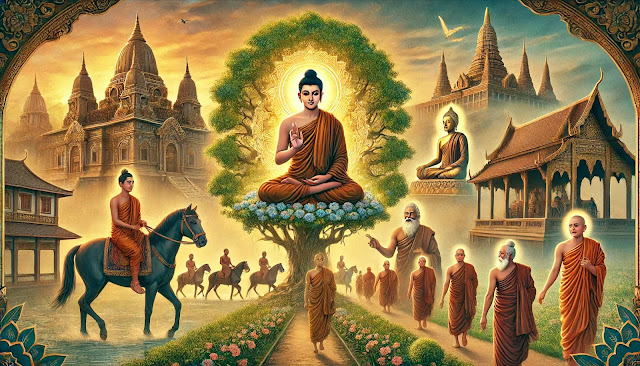What is Buddhism?
Buddhism serves as a faith for approximately 300 million followers who spread across the globe. Budhi is where the name Buddhism originates from which means awakening. About 2,500 years ago Siddharth Gautam achieved enlightenment to become the Buddha at age 35.
● Is Buddhism a Religion?
Buddhism exists beyond religious categories because its essence resembles both philosophy and 'life approach'. Buddhism serves as philosophy since philosophy means 'love of wisdom' and its teachings can be condensed into three components.
(1) to lead a moral life,
(2) People should maintain awareness of their thoughts as well as their actions.
(3) to develop wisdom and understanding.
● Why is Buddhism Considered a Philosophy?
Buddhism mirrors the meaning of philosophy because it incorporates three essential elements "love of wisdom":
1️⃣ (Prajñā) stands as Wisdom in Buddhism since it functions as a method for grasping reality and reaching enlightenment.
2️⃣ Ethical Conduct(Śīla) - represents ethical conduct which means living with compassion and moral integrity.
3️⃣ Mental Discipline (Samādhi) – Practicing meditation and mindfulness.
Buddhism emphasizes personal understanding and wisdom as well as freedom from suffering rather than divine worship.
● How Can Buddhism Help Me?
The teachings of Buddhism present an existence meaning and offer solutions to global unjust and unequal circumstances while providing guidelines toward enduring life fulfillment.
● Why is Buddhism Becoming Popular?
Buddhism gains increasing popularity across western nations because it provides solutions to various problems found in contemporary materialistic societies. Additionally Buddhism provides interested students with a profound investigation of natural therapeutic approaches that prominent psychologists worldwide now recognize as advanced and efficient.
● Who Was the Buddha?
Siddhartha Gotama emerged from a royal background in Lumbini where it now stands as Nepal in 563 BC. When he reached his 29th year he discovered that the wealth and luxurious lifestyle had failed to bring him happiness thus he embarked on a journey among the various religious and philosophical teachings of that time to discover human happiness. Through six years of meditation and study Gotama discovered the middle path which brought him to enlightenment. The enlightened Buddha devoted his remaining seventy years to teach the Buddhist principles known as Dhamma Truth which continued until his passing at eighty years old.
● Was the Buddha a God?
He neither claimed to be enlightened nor did he pretend to have any such status. Through his life he taught others how to attain enlightenment using firsthand methods.
● Do Buddhists Worship Idols?
Buddhists show reverence towards Buddha statues through respectful actions which do not amount to either worship or seeking petition for favors. The Buddha statue with its hands resting tranquil on the lap and pleasant smile encourages us to work toward cultivating peace and love inside ourselves. People show appreciation to the teachings through gestures of bowing before the statue.











